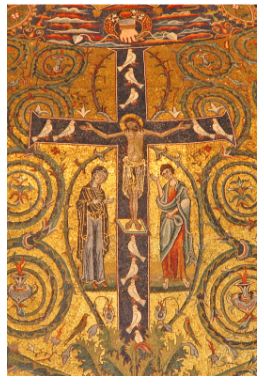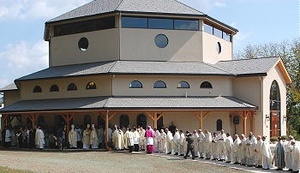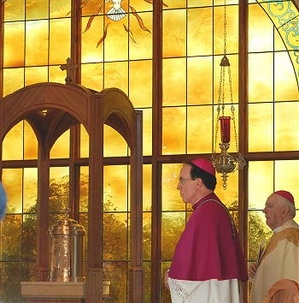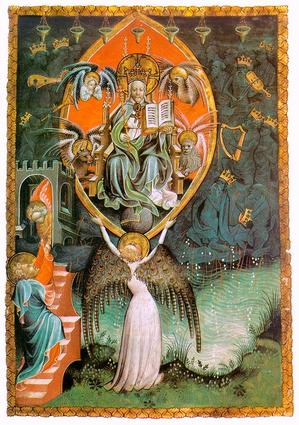
Sacred Liturgy & Sacraments: September 2010 Archives

 Zacchaeus, make haste, and come down; for today I must abide at thy house. And he made haste, and came down, and received him joyfully into his house. This day is salvation come to this house from the Lord, alleluia.
Zacchaeus, make haste, and come down; for today I must abide at thy house. And he made haste, and came down, and received him joyfully into his house. This day is salvation come to this house from the Lord, alleluia.
Today, the Director of the Liturgical Institute at Mundelein Seminary, Father Douglas Martis, gave the following address today. Father Martis is a priest of the Diocese of Joliet and on the faculty of Mundelein Seminary. Some very useful lessons to keep in mind.
I. Sons.
My Dear Sons,
This was the term used by Fr. Fuller on Monday morning, "sons." It is a beautiful expression. You are sons to us. Our relationship, despite the distance or proximity of age, is one of father and son, or in certain cases, as with our Director of Music, one of motherly concern. No disrespect to your age or your experience is intended.
We have a common project here, to prepare you for ministry to the Church as priests.
And for those of us concerned directly with your liturgical formation, our project is to prepare you in such a way as to manifest an authentic and profound intelligence of and respect for the Church's public prayer, so as to demonstrate a true love for God's people.
This responsibility belongs jointly to you and to us. While it is true that in some ways you are brothers, on another day you will be brothers in a deeper sense. For now, you sons, we love you, and care for you, and want genuinely go give to you what parents give to beloved sons.
What we do, that to which we have committed these years of our lives, is for your good for the good of the Church.
My colleagues and I have strong personalities. We do not have an innate need to challenge you or correct you in order to caress on own self-importance. The program we have of liturgical preparation and celebration, of respecting ritual and integrating prayer, of insisting on music and chant is not the imposition of our own puny personal preferences.
Our teaching is derived from the desire of the Church herself: rooted inSacrosanctum concilium, the ritual books that are the fruit of the Council, and the Church's liturgical theology.
It is neither our interest nor our agenda to promote our opinions as if they carried the authority of the Church. Our desire is to present you with the Church's teaching, for love of you and love of her.
We want you to follow our example.
II. Change.
Things change. That's okay.
Get used to it. New classmates, new teachers, new schedules. New prayers, new responsibilities, new living situations. New circumstances, new trends, new conflicts. New joys, new insights, new challenges.
This is the life of a priest in the 21st century.
Learning to navigate change is an essential skill you will need for the rest of your lives.
Let us be clear. God remains the same. Our upset, generally has more to do with what we want,than with the objective reality of the change. This is not about you.
The church of the 1960s saw excitement and enthusiasm, and resistance, too.
In your situation today, learn to appreciate your elders' excitement, enthusiasm, and resistance. In 2011 you will know the same. Excitement, enthusiasm, and resistance.
Change leads some to heresy or schism.
Avoid the temptation of being captured by the caricatures of the media, whether your news source is FOX or CNN, whether you are a fan of NCReporter or NCRegister whether you get your information from the blogs or from television. Do not allow yourself to get sucked in by the politics of resistance. When change leads to dissemblance, only the devil is served.
As priests, ministers, official representatives of the Church, you have a greater responsibility than settling for, or promoting polemics. Not only that, as a man of prayer, you have--even now!--the responsibility of learning to embrace the beauty, the rich theology, the deep spirituality of the Church's liturgical prayer.
You can stand aloof as a member of an elite that knows the rich treasure of prayer or having integrated it yourself you can teach, inform, model, and so help others to do the same.
What is needed here is not a so called "pastoral decision" of diluting prayer but a conviction of genuine care, catechesis and formation that raises up the faithful.
This may be the greatest ecclesial moment in your lifetime. Yours is not the only generation to have ever known liturgical change.
"We are not in the same situation as ... 1963. One cannot therefore continue to speak of a change as it was spoken of at the time of the Constitution'spublication; rather one has to speak of an ever deeper grasp of the Liturgy of the Church, celebrated according to the current books and lived above all as a reality in the spiritual order."[i]
...now the time has come ... to publish liturgical books in a form that both testifies to the stability achieved and is worthy of the mysteries celebrated.[ii]"
If the intuition of Pope John Paul II is correct, if the Third Edition of the Roman Missal signals the maturity of liturgical reform, its dignity and stability, then the post-Counciliar church has survived adolescence and provides the opportunity now for a more adult expression of faith. You and I stand on the threshold of this moment!
III. Texts.
The challenge with public prayer has always been to make the words our own. Let us understand then, that the great opportunity afforded us in this moment is not one of changing words. This is about opening a more direct path to the meaning of Catholic worship--a meaning that has always been there and is there even now in the texts we use today.
What, then, are we to do?
Here is the simple prescription:
Take the words,
learn to understand them,
make the connections.
Follow the example of ancient readers:
take the text, do not read it through as if you already understand [this "mystery ever ancient, ever new!"] take the text, dwell there. Abide between the lines.[iii]
"This quality of reading, which enables a reader to acquire a text not simply by perusing the words but by actually making them part of the reader's self..."[iv] Here is found true blessing.
Know what you are doing. Listen for the biblical narrative. The texts of the Mass were not put there by some malicious committee looking to trip you up. These texts resound with the voice of God's own Word. Find the origin, search the reference.
I know this is not easy. We live in a culture that does not foster this kind of connection. Contemporary culture thrives on sound bites; idolizes short cuts and Cliffnotes, Sparknotes and books for dummies.
For your part, claim your place in Catholic culture, with its own language and grammar, its own symbols and meaning.
Plunge yourself in a baptism of the Church's signs. Let the insight of your patristic reading anoint your understanding and illumine your prayer. Open your eyes to what is around, even here on this campus, with its natural beauty, its architectural wonders, its volumes of wisdom, and its varied residents.
A steady diet of this, an habitual practice of attention to everything is an essential preparation for prayer. Collect these insights, engage these people, absorb this environment.
Your responsibility as seminarian, is to learn this, to integrate it; then you must model it for others and teach it to those in your care.
You become a mystagogue.
IV. Now.
This begins now. You do not have to wait. You walk out of this auditorium and cross a threshold.
Let that crossing be the crossing of every threshold.
Let every word of the Mass bring you to a biblical narrative, a theological insight, a pastoral encounter.
Let every sign of the Cross bring you to the mount of the Ascension.[v] Let it be, every time, a wrapping yourself in the Trinity, a conforming yourself to the cross of Christ. May it bring you back to your baptism and forward to your funeral. May it inspire the crosses you may trace some day on the breast of future neophytes, on the foreheads of the anointed, on the palms of priests.
Let every greeting of the Mass resound with the words of the great missionary Paul,[vi] or the salutation of Boaz to harvesters,[vii] or the words of the Risen Christ.[viii]
Let every response, whether it be "And also with you" now or "And with your spirit" at another time, let this reply make us marvel at God's wisdom in Ordering the Church and in the Spirit's work of assembling members with different gifts into one holy body.
Let every procession remind us of life's pilgrimage to heaven; every standing be in implicit imitation of the Great High Priest: "Here I am, Lord. I come to do your will."[ix] Let every genuflection, every bow be the humble acknowledgement of what God has done for us in Christ Jesus.
Let our stance at the Alleluia be so completely devoted to the praise of Christ present in the Word, that rather than tracking the deacon and registering ritual glitches, our minds, bodies and voices melt into the Eternal.
Let prayers in the preparation of bread and wine, bring us to Daniel's fiery furnace, so that the words of Azariah become our own: we have nothing else to offer, but with contrite hearts and humble spirits let us be received.[x] And may the dew-laden breeze[xi] that soothed the heat of that inferno, come like dew in the desert,[xii] to provide us with our daily bread."Priests of the Lord, bless the Lord." [xiii]
Let every dismissal, GO! bring us back again to Ascension,[xiv] and to every sending of Christ: "You, too, go to the vineyard!"[xv]
Do you see? At every moment, at every turn, around every corner, the bible is there. A prayer, a doctrine, an insight. And it has been there all along.
All we have, are, do, everything we love... is here.
Learning this. Integrating this. Modeling this. Teaching it is our project.
Will you make it your project too?
Notes
[i] Vicesimus quintus annus, 1988, 14.
[ii] VQA, 20.
[iii] Alberto Manguel: A History of Reading. "You did not read books through; you dwelt, abided between their lines and, reopening them after an interval, surprised yourself at the spot where you had halted.", 12.
[iv] Manguel, 58.
[v] Mt 28:19.
[vi] 2 Cor 13:13 et al.
[vii] Ruth 2:4.
[viii] Jn 20:19.
[ix] Heb 10:9.
[x] Dan 3:39-40.
[xi] Dan 3:50.
[xii] Ex 16:13-17.
[xiii] Dan 3:84.
[xiv] Mt 28:19.
[xv] Mt 20.D


